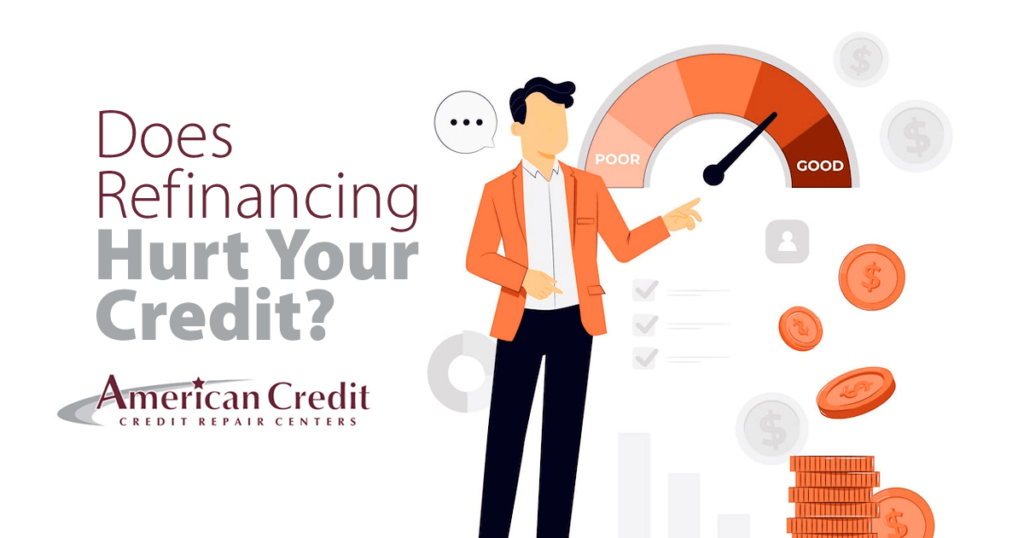
Refinancing your debt, such as a mortgage or car loan, can have many benefits. It can free up more cash to save or use for living expenses. However, it can hurt your credit for a few reasons. Before you decide, read on to learn how refinancing a loan affects your credit.
What Is Refinancing?
If you refinance a loan, you basically take out a new loan to pay for what you owe on the original one. The loan agreement is modified so that the loan term may be extended, interest rate lowered, or monthly payments reduced. In some cases, you can consolidate multiple loans into one payment. If your current payments are too high and your credit score has improved since applying for the original loan, this may be an option worth considering.
Refinancing and Your Credit Score
Refinancing can lower your credit score for a few reasons, including:
- Hard Inquiry: When you apply for refinancing, a lender will run a credit check. If this involves a hard inquiry, it will remain on your credit report for two years. The greatest impact is if multiple hard inquiries are run over several months. You can reduce the damage done to your credit score by making a list of lenders to contact and submitting your applications over a two-week period. Your credit score will probably drop only a few points and rebound quickly if you continue making on-time payments. After refinancing, try to avoid new hard inquiries for at least a year.
- Multiple Loan Applications: Every time you apply with a different lender to refinance a loan, they run a hard credit inquiry. The more hard inquiries you have over a certain time period, the greater the effect on your credit score. It’s best to apply to all lenders in a short time, but the preferred window varies with each scoring model. You may have 14 to 45 days depending on the model used to calculate your credit score.
- New Debt: An older loan proves your track record and credit worthiness. A long-term account in good standing is more beneficial than a new line of credit. When you refinance, the original loan is closed. It’s therefore eliminated from your credit history, which makes up 15% of your FICO® score. The refinanced loan appears as new debt and you’ll need to rebuild your payment history for it to show positively on your credit reports.
- Closing an Account: Whenever you close a credit account, this will reflect on your credit report. The overall effect varies depending on the age and size of the account. In terms of age, your credit history comes into play. If it’s a large account, then your credit utilization ratio may be impacted in a negative way. It’s therefore important to evaluate your credit before deciding on refinancing.
When Is the Best Time to Refinance a Loan?
The question of “Does refinancing hurt your credit?” is more or less of a concern depending on when you decide to refinance. Despite the impact on your credit score, refinancing a mortgage can save you money over the long run. It can eliminate the high mortgage insurance premiums with a Federal Housing Administration loan as well. But there are also origination, appraisal, and credit reporting fees. Work with your lender to determine how much you could save.
Federal student loans have more benefits, so you’re probably better off refinancing a private student loan. Doing so can be more favorable with unpredictable future interest rates, improved credit (which can qualify you for a lower rate), or when rates are lower. You might want to consider refinancing an auto loan if you have access to lower interest rates as well, or the dealership didn’t offer the most competitive rates. Generally, you stand to benefit if your vehicle is worth more than your outstanding balance.
If you have a personal loan, other reasons to refinance include converting to a fixed-rate loan, a decrease in income, or to avoid an upcoming balloon payment. Perhaps you’re looking to pay off the loan sooner and/or don’t mind paying application and origination fees. In any case, building your credit before refinancing will help you qualify for the best interest rate.
Contact American Credit
Your credit may be impacted by negative information on your credit report, past delinquencies, defaults, bankruptcies, or issues with credit reporting. We use a pre-litigation process to get creditors and credit bureaus to respond. With a fair, accurate credit report, your credit score can increase quickly and qualify you to refinance a loan. Call (855) 982-2750 to learn more.

Recent Comments